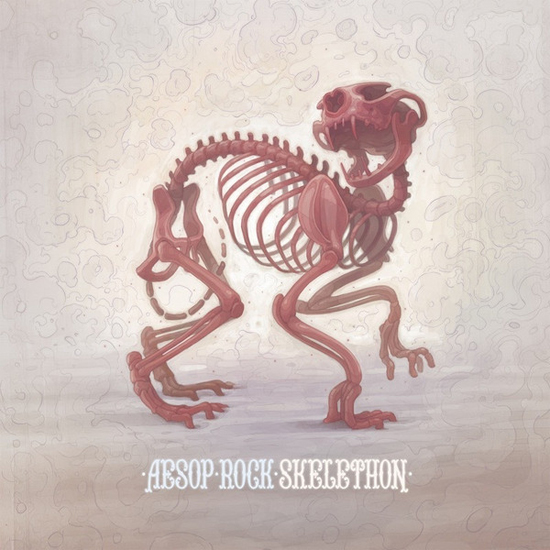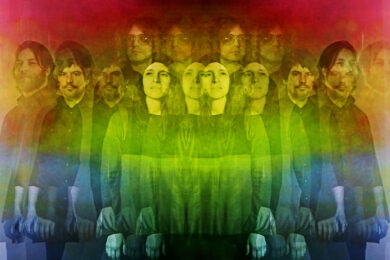The digitisation of music consumption is either the best or the worst thing that could have happened to Aesop Rock. On the one hand, while hip-hop’s free mixtape culture moves at lightning pace, Aesop’s dense, lyrical mosaics can take months, even years, to digest. The sheer volume and availability of rap music in 2012 has made keeping up with it a daily struggle, let alone trying to form meaningful bonds with records. So for an artist like Aesop Rock, who requires your total, undivided attention if you’re to stand any chance of breaking down his songs, the mêlée for recognition is tougher than ever.
On the other hand, the saturation of hastily produced hip-hop seeking instant gratification makes Aesop Rock’s star shine all the more brightly. Arriving a matter of months after Lil B released an 855 song mixtape that nobody listened to, Skelethon is Aesop’s first solo album since 2007 – and it shows. This is not intended as a whining diatribe against our increasingly frivolous relationships with rap records, but this is one that shook me by the shoulders with a potent reminder that music is a two-way process. Skelethon is a wildly energetic, funny, poignant, nostalgic and sad record; the result of huge personal investment on Aesop’s behalf, but without substantial effort from the listener all of that is rendered worthless.
Lyrically, Aesop has always followed freeform internal monologues, but in the five years since he released None Shall Pass his focus has become even more inward. This is the guy who once wrote the fiercely combative indie-rap fuck you jam "We’re Famous" alongside El-P, but now proclaims himself an "armchair hater, I wouldn’t piss on your coffin, but when I see your picture I draw dicks on it." Production-wise too, Skelethon is his first fully self-produced solo effort without contribution from regular collaborator Blockhead. Recent collaborative projects with Felt and Hail Mary Mallon have certainly honed Aesop’s skills as a beatmaker, and his eerie, bass-heavy production creates an apt mood for a record fixated with death.
If this all sounds a bit heavy, thankfully Skelethon is also wonderfully funny. ‘Grace’, for instance, tells the story of a dinner table confrontation between a young Aesop Rock and his father, resulting in a convoluted stand-off over his reluctance to eat a side of green beans. This warm nostalgia is revisited on the ode to teenage rebellion ‘ZZZ Top’, and then through a touching tribute to the late Def Jukie Camu Tao, on ‘Racing Stripes’. Aesop’s remembrance of his friend through goofy but affectionate storytelling is also the closest the record comes to a proper hook.
The loving recollection in ‘Racing Stripes’ is purposefully positioned behind the Kimya Dawson assisted ‘Crows 1’ and ‘Crows 2’, which examine the grieving process and the displacement of the graveyard within the context of lost loved ones. As suggested by the record’s title and artwork, death is a subject that has weighed heavily on Aesop’s mind throughout the writing process, and it’s in this two-parter which that theme is translated most poignantly. As he wanders the graveyard revelling in the gothic imagery of headstones, woven branches and "cousin death’s wing-ed lapdogs" (that’s bats to you and I), Dawson’s spooky vocal clarifies the awkward distance between memory and decay; "I’m not gonna rot, no, fuck that snot, you can let them let you rot, man, but I’m not gonna watch / I’m not gonna stand atop your plot, I love you friends, but I’m just not."
As well as death, Skelethon is an album about childhood and isolation; finding comfort in the former while expressing difficulty with the latter. At times it seems almost as though Aesop has lost his faith in humanity, bemoaning society’s conventions and values while finding pleasure in donuts (‘Fryerstarter’), fireworks (‘Saturn Missiles’) and animals (‘Homemade Mummy’). ‘Ruby 81’ paints this picture most vividly, telling the story of a missing two-year old girl at a panic stricken 4th of July party, rescued from a pool by the family beagle who carries the child between its teeth. "Good dog", the song concludes, as a tense, beatless drone reaches its climax and the party guests try to make sense of the chaos.
Skelethon‘s final play and masterstroke is to take all of the tantrum and frustration from its previous 14 tracks, and turn it on himself in the concluding ‘Gopher Guts’. A repeating motif in which he claws baby snakes and green frogs out from the ground reaffirms Aesop’s affinity with nature, but despite willing these animals to have dynamic, meaningful existences, he simply lets them go. Then, in the song’s bruised and uncharacteristically straight-talking last verse, a series of confessions; "I have been completely unable to maintain any semblance of relationship on any level / I have been a bastard to the people who have actively attempted to deliver me from peril." Stepping out from behind a barrier of language, here is a brutally honest moment of self-reflective vulnerability. For an album which so brilliantly documents one man’s life-long rebellion, it’s powerful that its final soul-baring verse should reduce Aesop Rock to the raw bones which haunt his existence – to the Skelethon.




